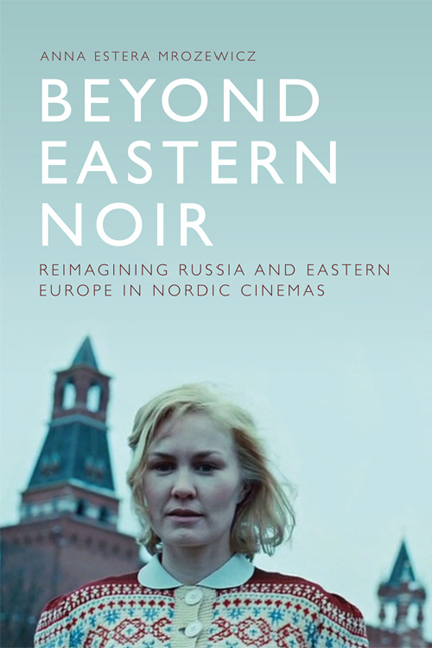Book contents
- Frontmatter
- Contents
- List of Figures
- Acknowledgements
- Introduction – The Iron Curtain Effect: Nordic Eastern Noir
- 1 Borders: Russia and Eastern Europe as a Crime Scene
- 2 Boundaries: Infiltrated Identities
- 3 The Baltic Boundary
- 4 Guilt and Shame in (Trans)national Spaces
- 5 Embodying the Fear of Russia: The Militarised Body
- 6 Polish Spectres in our House: Revisiting the Nordic Metaphor of the Home
- Afterword – Beyond Eastern Noir: Toward a New (Cinematic) Space
- Bibliography
- Filmography
- Index
1 - Borders: Russia and Eastern Europe as a Crime Scene
Published online by Cambridge University Press: 24 April 2021
- Frontmatter
- Contents
- List of Figures
- Acknowledgements
- Introduction – The Iron Curtain Effect: Nordic Eastern Noir
- 1 Borders: Russia and Eastern Europe as a Crime Scene
- 2 Boundaries: Infiltrated Identities
- 3 The Baltic Boundary
- 4 Guilt and Shame in (Trans)national Spaces
- 5 Embodying the Fear of Russia: The Militarised Body
- 6 Polish Spectres in our House: Revisiting the Nordic Metaphor of the Home
- Afterword – Beyond Eastern Noir: Toward a New (Cinematic) Space
- Bibliography
- Filmography
- Index
Summary
Borders and border crossings constitute a powerful trope in Nordic narratives on Russia and neighbouring Eastern Europe. This chapter investigates films that not only (explicitly or implicitly) thematise borders, but, more importantly, adopt a border discourse on Russia and Eastern Europe – a cinematic pattern that I define as Eastern noir. As emphasised in the Introduction, the term ‘border’ is understood as distinct from ‘boundary’. Unlike boundary, which problematises the very idea of border and is porous in character, border is hierarchical and vertical as such: delineated from the centre, it designates both a core and its margin.
The Nordic border discourse that structures Eastern noir narratives represents Russia and/or Eastern Europe in terms of extensive division: it produces two discontinuous entities, two separated ‘sides’ (see Nail 2016: loc. 109–15). However, even the most hierarchical cinematic approaches to Russia and Eastern Europe reveal ruptures in this oppositional discourse. As we shall see, while Eastern noir expresses Nordic cultural superiority and aims to discursively subordinate Russia, this relation of superiority versus inferiority is often charged with ambivalence: the Nordic discursive power may serve to hide the deep-seated anxiety of the small (both demo-graphically and in terms of political control) Nordic nations regarding their position as neighbours with the great Soviet Empire/Russia.
Negative representations of Russia, especially from the last years of the Cold War, often reflect, both thematically and in terms of genre (notably, the popular choice of the Hollywood inspired action film genre), Norden's ideological alliance with the US and a desire to draw a distinction between Nordic society and the USSR. At the same time, there exists a tendency in Eastern noir to express ambivalence towards any alliances with the two superpowers. Marking clear distinctions towards both the West and East may serve to emphasise the idea of Norden's uniqueness. During the Cold War, this uniqueness (characteristic of so-called Nordic exceptionalism) denoted, among other things, the construction of the Nordic identity as a ‘better’ region compared to the rest of (‘warlike’) Europe and generally the West. The Nordic region represented a third way between communism and capitalism and ‘a model of the enlightened, anti-militaristic society’ (Wæver 1992: 77; see also Browning 2007).
- Type
- Chapter
- Information
- Beyond Eastern NoirReimagining Russia and Eastern Europe in Nordic Cinemas, pp. 31 - 61Publisher: Edinburgh University PressPrint publication year: 2018



